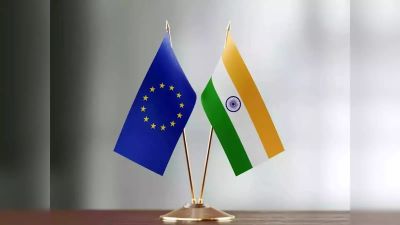Context-
The ongoing dispute between the European Union (EU) and India at the World Trade Organisation (WTO) over trade duties on information-communication technology (ICT) products underscores the complexities of global trade relations. Since its inception in 2019, this disagreement has become emblematic of the intricate legal and diplomatic challenges inherent in modern trade disputes. At its core, the dispute revolves around the EU's contention that India's imposition of customs duties ranging from 7.55 to 20 percent on ICT products since 2014 has significantly hindered its exports to India, amounting to approximately 600 million euros.
Background of the Dispute
● EU's Allegations
The EU alleges that India's tariff policies, particularly those concerning ICT products like mobile phones, integrated circuits, and optical instruments, have contravened WTO regulations, notably the General Agreements on Trade and Tariff (GATT). These tariffs, instituted by India since 2014, have imposed a significant burden on EU exports to India, prompting the EU to challenge India's compliance with WTO rules.
● Legal Challenges
In April 2023, a WTO panel ruled against India's tariff norms, asserting that they were inconsistent with global standards. Despite India's attempts to rectify its tariff commitments and invoke the Information Technology Agreement (ITA), the panel maintained its stance, arguing that changes to tariff commitments necessitate negotiations among WTO members. This legal deadlock has raised fundamental questions about the interpretation and enforcement of WTO agreements.
Implications for India-EU FTA Negotiations
● Stalled Progress
The dispute has cast a pall over the India-EU Free Trade Agreement (FTA) negotiations, which resumed in 2022 after a hiatus since 2013. The EU's insistence on duty concessions from India has created a significant stumbling block, as India contends that such concessions may violate global trade norms and undermine its sovereignty in trade policy formulation.
● Environmental Concerns
Furthermore, environmental considerations, such as India's climate record and its alignment with global sustainability standards, have emerged as contentious issues in the FTA negotiations. Policies like the Carbon-Border Adjustment Mechanism (CBAM) proposed by the EU could further strain bilateral relations by imposing additional tariffs on EU exports to India.
Legal and Arbitration Recourses
● WTO Appellate Body Blockade
Despite India's appeal against the WTO panel's rulings, the appellate body remains non-functional due to disagreements among member states over its composition. This impasse highlights broader challenges within the WTO, including structural imbalances and the waning confidence of developing countries in the dispute resolution mechanisms.
● Arbitration Alternatives
While the EU has advocated for arbitration as an alternative dispute resolution mechanism, India remains wary of interim agreements that may undermine the multilateral trading system. The pursuit of improved investor-state arbitration by the EU further complicates the resolution process, necessitating careful consideration of legal and diplomatic implications.
Impact on Domestic Manufacturing and Global Trade
● India's Manufacturing Ambitions
India's reluctance to compromise on tariff concessions stems from its broader vision of "Atmanirbhar Bharat" (self-reliant India), aimed at bolstering domestic manufacturing and reducing reliance on imports, particularly from China. However, the tariff dispute poses significant challenges to India's efforts to establish itself as a global manufacturing hub in the ICT sector.
● Global Trade Dynamics
The dispute reflects broader tensions within the global trade landscape, characterized by disparities in bargaining power and influence among developed and developing countries. India's insistence on protecting its domestic industries underscores the need for equitable trade practices and institutional reforms within international trade governance frameworks.
Pathways for Resolution and Reform
● Resolving the WTO dispute requires concerted efforts from both India and the EU, as well as broader reforms within the multilateral trading system. Bridging the gap between legal interpretations and trade practices necessitates dialogue, compromise, and adherence to established dispute resolution mechanisms. Revitalizing the WTO appellate body, through consensus-building and institutional reform, remains essential to restoring confidence in the multilateral trading system.
● Furthermore, exploring alternative dispute resolution mechanisms, such as arbitration, offers interim solutions while addressing systemic challenges within the WTO framework. However, balancing the imperative for swift resolution with the need for comprehensive legal analysis and due process remains paramount in safeguarding the integrity of the dispute resolution process.
Conclusion
The WTO dispute between the EU and India over trade duties on ICT products represents a critical juncture in the evolution of global trade governance. As both parties navigate the complexities of legal interpretation, diplomatic negotiations, and economic imperatives, the resolution of this dispute will have far-reaching implications for bilateral relations, regional trade dynamics, and the multilateral trading system as a whole.
Moving forward, concerted efforts to address structural imbalances within the WTO, promote inclusive dialogue, and foster mutual understanding are essential for building a more resilient and equitable global trading architecture. By embracing the principles of cooperation, transparency, and reciprocity, stakeholders can pave the way for a more prosperous and sustainable future for all nations involved.
The EU-India WTO dispute underscores the urgent need for collaborative and principled approaches to address the complex challenges facing the global trading system in the 21st century. As countries strive to reconcile their economic interests with broader societal goals, the pursuit of fair, rules-based trade remains paramount in fostering shared prosperity and sustainable development on a global scale.
|
Probable Questions for UPSC Mains Exam
|
Source- The Hindu







